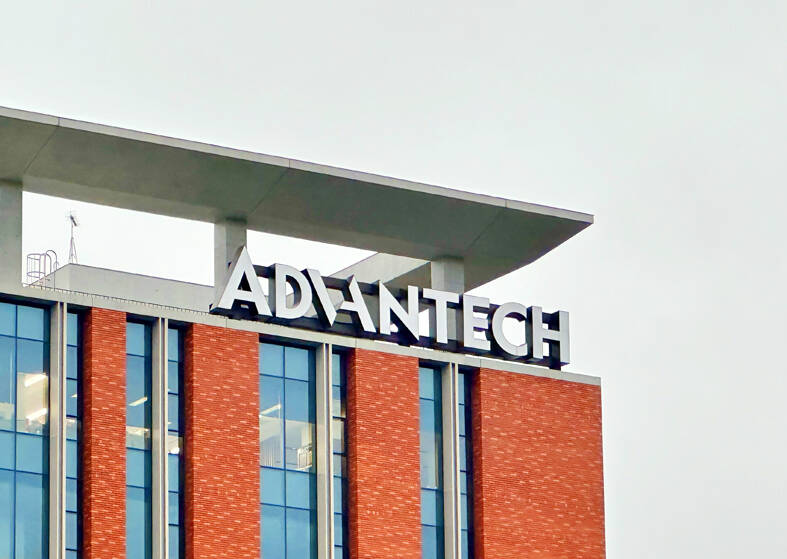Advantech Co (研華) expects revenue momentum to gradually strengthen in the second half of this year after its sales and earnings grew last quarter compared with the previous quarter, the nation’s largest industrial PC maker said yesterday, citing customers’ growing interest in its applications amid global industrial automation and the smart energy trend.
The company also expects great business opportunities ahead driven by advancements in artificial intelligence (AI) technology, as it has teamed up with silicon vendors and AI software partners to develop an Edge AI ecosystem, Advantech said in a statement released after a board meeting.
“This initiative aims to offer a broader range of hardware, software and services choices, aspiring to become the preferred ally for enterprise customers in Edge AI applications,” the statement said.

Photo: Fang Wei-chieh, Taipei Times
The company’s book-to-bill ratio climbed to 1.01 last quarter from 0.97 in the first quarter, exceeding the 1.00 mark for the first time since the second quarter of 2022, as the recovering global economy helped improve its order intake and drove sales growth, it said.
A regional breakdown of the book-to-bill ratio revealed the company’s optimism regarding steady recovery in global macroeconomics and corporate spending, as the ratio last quarter was 1.00 for North America, 1.04 for Europe and 1.02 for China, it added.
Advantech, the first regional industrial PC vendor dedicated to smart cities and the Internet of Things, reported a net profit of NT$2.11 billion (US$64.3 million) in the second quarter, up 6 percent from the previous quarter, but down 30 percent from a year earlier.
Earnings per share were NT$2.46 last quarter, compared with NT$2.32 in the first quarter and NT$3.51 a year earlier.
Second-quarter revenue was NT$14.64 billion, up 6 percent quarter-on-quarter, but down 14 percent year-on-year, the company said.
Gross and operating margins improved last quarter to 40.2 percent and 14.3 percent respectively from the previous quarter, it added.
Advantech’s cumulative net profit in the first half of this year decreased 31 percent year-on-year to NT$4.11 billion, or earnings per share of NT$4.78, while total revenue fell 17 percent to NT$28.52 billion from a year earlier.
“The revenue and profits in the first half declined by double-digit percentages mainly due to the systematic impacts of geopolitical issues and high inflation, resulting in slowing demand in global end-markets. However, as the global economy slowly recovered, overall order demand has rebounded,” Advantech chief financial officer and president of general management Eric Chen (陳清熙) said in the statement.
By region, sales in Taiwan during the first half outperformed other markets with a 12 percent annual increase, mainly driven by shipments of products linked to semiconductor equipment and gaming projects, Advantech said.
Sales to North America, Europe, North Asia and emerging markets all posted double-digit percentage declines, while shipments to China registered a single-digit percentage fall on an annual basis, the company said.

Taiwan’s foreign exchange reserves hit a record high at the end of last month, surpassing the US$600 billion mark for the first time, the central bank said yesterday. Last month, the country’s foreign exchange reserves rose US$5.51 billion from a month earlier to reach US$602.94 billion due to an increase in returns from the central bank’s portfolio management, the movement of other foreign currencies in the portfolio against the US dollar and the bank’s efforts to smooth the volatility of the New Taiwan dollar. Department of Foreign Exchange Director-General Eugene Tsai (蔡炯民)said a rate cut cycle launched by the US Federal Reserve

Handset camera lens maker Largan Precision Co (大立光) on Sunday reported a 6.71 percent year-on-year decline in revenue for the third quarter, despite revenue last month hitting the highest level in 11 months. Third-quarter revenue was NT$17.68 billion (US$581.2 million), compared with NT$18.95 billion a year earlier, the company said in a statement. The figure was in line with Yuanta Securities Investment Consulting Co’s (元大投顧) forecast of NT$17.9 billion, but missed the market consensus estimate of NT$18.97 billion. The third-quarter revenue was a 51.44 percent increase from NT$11.67 billion in the second quarter, as the quarter is usually the peak

The US government on Wednesday sanctioned more than two dozen companies in China, Turkey and the United Arab Emirates, including offshoots of a US chip firm, accusing the businesses of providing illicit support to Iran’s military or proxies. The US Department of Commerce included two subsidiaries of US-based chip distributor Arrow Electronics Inc (艾睿電子) on its so-called entity list published on the federal register for facilitating purchases by Iran’s proxies of US tech. Arrow spokesman John Hourigan said that the subsidiaries have been operating in full compliance with US export control regulations and his company is discussing with the US Bureau of

Pegatron Corp (和碩), a key assembler of Apple Inc’s iPhones, on Thursday reported a 12.3 percent year-on-year decline in revenue for last quarter to NT$257.86 billion (US$8.44 billion), but it expects revenue to improve in the second half on traditional holiday demand. The fourth quarter is usually the peak season for its communications products, a company official said on condition of anonymity. As Apple released its new iPhone 17 series early last month, sales in the communications segment rose sequentially last month, the official said. Shipments to Apple have been stable and in line with earlier expectations, they said. Pegatron shipped 2.4 million notebook